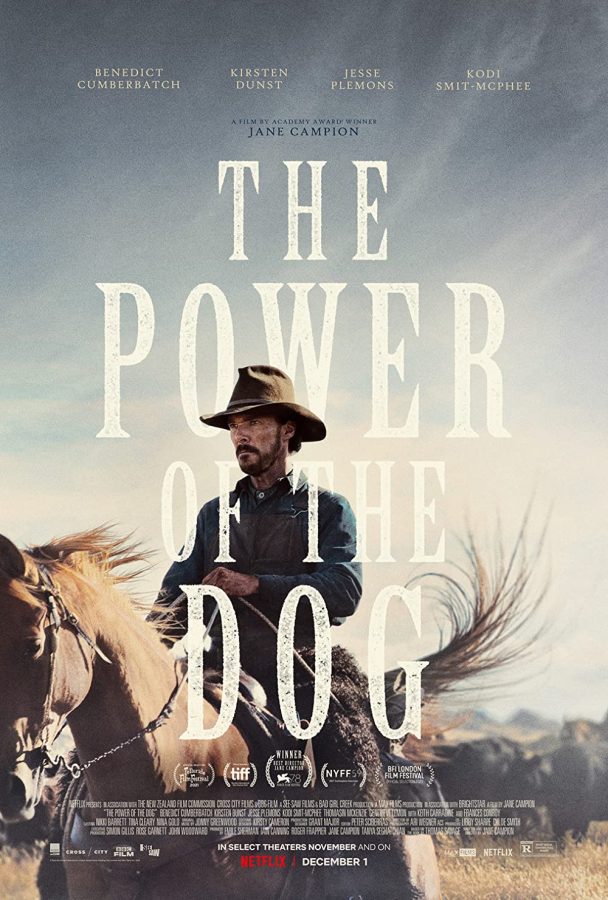‘The Power of the Dog’ brings a new twist to the western genre
“The Power of the Dog” is nominated for 12 Oscar awards, including Best Picture, Best Leading Actor (Benedict Cumberbatch) and Best Achievement in Directing (Jane Campion).
March 21, 2022
“The Power of the Dog” brings audiences a new taste of the western film genre, delivering a refreshing addition of extra drama and eerie uncomfortableness.
The story tells of a brutally sharp-tongued rancher named Phil Burbank (Benedict Cumberbatch) and his brother, George (Jesse Plemons) in 1925 Montana. On a trip to a market, the brothers and their cowhands eat at the Red Mill, a restaurant run by the mild-tempered Rose Gordon (Kirsten Dunst) and her reserved son, Peter (Kodi Smit-McPhee). Phil is so rude and unrestrained in his bullying of the Gordons during dinner that he brings Rose to the point of tears and causes Peter to walk off his duty as their server. This leads George to comfort Rose, subsequently resulting in them falling in love and getting married. Phil is outraged by the presence of Rose and her son in his home, leading the entire group of characters down an excruciating path of terrible unrest when in the presence of Phil and his increasingly damaging insults.
Directed by Jane Campion, a filmmaker sometimes known for her skill of making audiences scared and uncomfortable in non-horror genres, this film highlights the universal uneasiness of change in the midst of unwelcoming individuals. On top of this, the story adds a fresh perspective on the ever-changing worldview of masculinity and its potential to become toxic and harmful. Phil has a stone-cold presence that strikes fear into those around him, simply frightened by the potential he has to tear them apart psychologically for the fun of it. He needs to prove to everyone that he is the most masculine, unwavering character they could ever find. This reach for validity consumes his entire purpose, taking away from the many possibilities he has to find love and belonging with those he does not have to prove himself to. By showing this, “The Power of the Dog” portrays a vicious, damaging face of masculinity that proves noxious to the world.
Furthermore, this film uses the harshness of its Montanan surroundings as a way to further call attention to the balance of roughness versus softness within the pronounced figures in the plot. Phil thrives in the presence of the elements, while Rose finds it difficult to find belonging on the ranch. Grand view of the geography surrounding the ranch puts audiences in the minds of Rose and Peter, who feel devastatingly small in a larger-than-life setting while constantly encountering the larger-than-life Phil. Through this, the film engages viewers in the eyes of the characters, further accentuating the drama and thrill that this tale provides.
Recently nominated for many Oscar awards, “The Power of the Dog” has gained the favor of many due to its unique yet familiarly unnerving nature. The feature is a Netflix film, so it is streaming on the service indefinitely, bringing the story to countless viewers in the mood for a thought-provoking tale.









